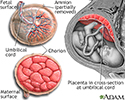Vaginal bleeding in pregnancy
Pregnancy - vaginal bleeding; Maternal blood loss - vaginal
Vaginal bleeding in pregnancy is any discharge of blood from the vagina during pregnancy.
Considerations
Up to 1 in 4 women have vaginal bleeding at some time during their pregnancy. Bleeding is more common in the first 3 months (first trimester), especially with twins.
Causes
A small amount of light spotting or bleeding may be noted 10 to 14 days after conception. This spotting results from the fertilized egg attaching itself to the lining of the uterus. Assuming it is light and does not last very long, this finding is most often nothing to be concerned about.
During the first 3 months, vaginal bleeding may be a sign of a miscarriage or ectopic pregnancy. Contact the health care provider right away.
During months 4 to 9, bleeding may be a sign of:
- The placenta separating from the inner wall of the uterus before the baby is born (abruptio placentae)
- Miscarriage
- The placenta covering all or part of the opening to the cervix (placenta previa)
- Vasa previa (the baby's blood vessels exposed across or near the internal opening of the uterus)
Other possible causes of vaginal bleeding during pregnancy:
- Cervical polyp or growth
- Early labor (bloody show)
- Ectopic pregnancy
- Infection of the cervix
- Trauma to the cervix from intercourse (small amount of bleeding) or recent pelvic exam
Home Care
Avoid sexual intercourse until your provider tells you that it is safe to start having intercourse again.
Consume only fluids if the bleeding and cramping are severe.
You may need to cut down your activity or be put on bed rest at home. Your provider will talk to you about the specific kinds of activity changes you may need to make.
Medicine is not needed in most cases. DO NOT take any medicine without talking with your provider.
Also, talk to your provider about what to look for, such as the amount of bleeding and color of the blood.
When to Contact a Medical Professional
Contact your provider if:
- You have any vaginal bleeding during pregnancy. Treat this as a potential emergency.
- You have vaginal bleeding and have placenta previa (get to the hospital right away).
- You have cramps or labor pains.
What to Expect at Your Office Visit
Your provider will take a medical history and perform a physical exam.
You will probably have a pelvic exam, or ultrasound as well.
Tests that may be done include:
- Blood tests
- Pregnancy ultrasound
- Ultrasound of the pelvis
You may be referred to a high risk pregnancy specialist (maternal fetal medicine specialist or perinatologist) for the duration of the pregnancy.
References
Francois KE, Foley MR. Antepartum and postpartum hemorrhage. In: Landon MB, Galan HL, Jauniaux ERM, et al, eds. Gabbe's Obstetrics: Normal and Problem Pregnancies. 8th ed. Philadelphia, PA: Elsevier; 2021:chap 18.
Henn MC, Lall MD. Complications of pregnancy. In: Walls RM, ed. Rosen's Emergency Medicine: Concepts and Clinical Practice. 10th ed. Philadelphia, PA: Elsevier; 2023:chap 173.
Turocy J, Williams Z. Early and recurrent pregnancy loss: etiology, diagnosis, treatment. In: Gershenson DM, Lentz GM, Valea FA, Lobo RA, eds. Comprehensive Gynecology. 8th ed. Philadelphia, PA: Elsevier; 2022:chap 16.
Ultrasound in pregnancy - illustration
Ultrasound in pregnancy
illustration
Female reproductive anatomy - illustration
Female reproductive anatomy
illustration
Anatomy of a normal placenta - illustration
Anatomy of a normal placenta
illustration
Placenta previa - illustration
Placenta previa
illustration
Vaginal bleeding during pregnancy - illustration
Vaginal bleeding during pregnancy
illustration
Ultrasound in pregnancy - illustration
Ultrasound in pregnancy
illustration
Female reproductive anatomy - illustration
Female reproductive anatomy
illustration
Anatomy of a normal placenta - illustration
Anatomy of a normal placenta
illustration
Placenta previa - illustration
Placenta previa
illustration
Vaginal bleeding during pregnancy - illustration
Vaginal bleeding during pregnancy
illustration
- Vaginal bleeding in early pregnancy
- Vaginal bleeding in late pregnancy
- After vaginal delivery - in the hospital
- Common symptoms during pregnancy
- Prenatal care in your first trimester
- Preterm labor
- Prenatal care in your second trimester
- Preeclampsia - self-care
- When your baby is stillborn
- Prenatal care in your third trimester
Review Date: 3/31/2024
Reviewed By: LaQuita Martinez, MD, Department of Obstetrics and Gynecology, Emory Johns Creek Hospital, Alpharetta, GA. Also reviewed by David C. Dugdale, MD, Medical Director, Brenda Conaway, Editorial Director, and the A.D.A.M. Editorial team.










